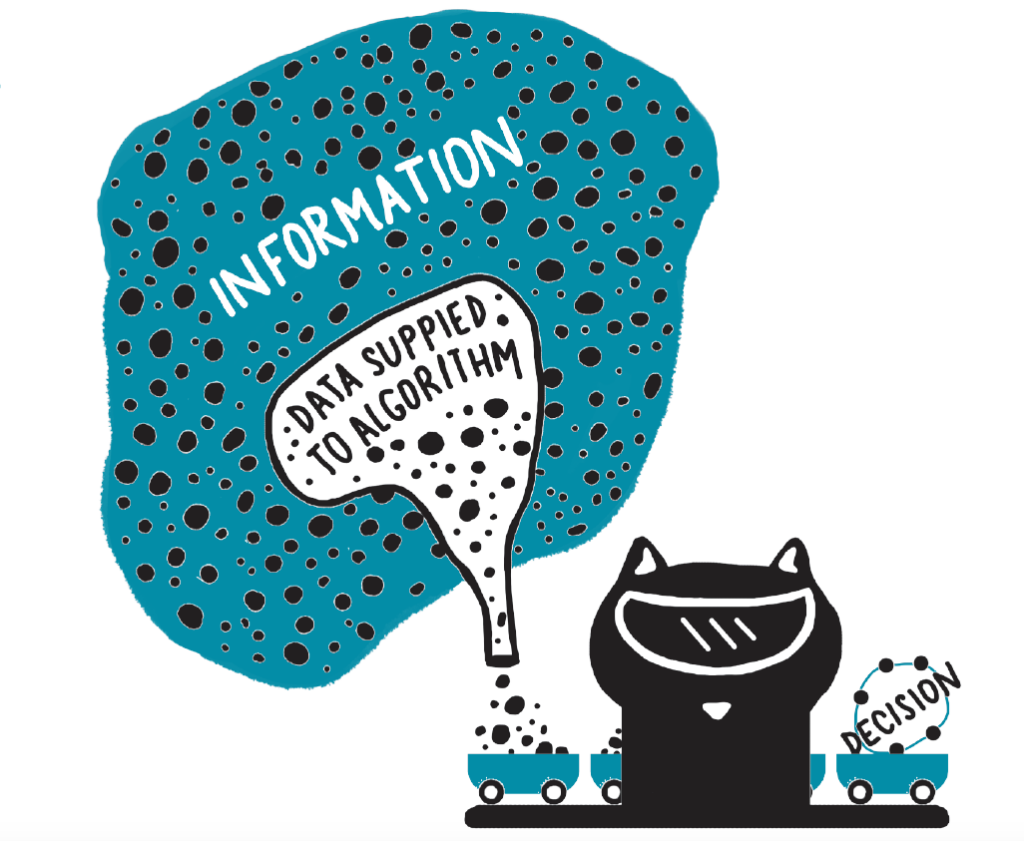Now Available: “A People’s Guide to Artificial Intelligence”
A People’s Guide to AI, is a new sponsored project of Allied Media Projects, launched in August, The zine is available via AMP’s website. It was the focus of a recent panel discussion in Detroit.
The People’s Guide to AI will also be presented at the upcoming NY Tech Zine Fair on December 1.
When researcher and artist Mimi Onuoha and Detroit-based educator Diana Nucera, or ‘Mother Cyborg’, met at a philanthropic conference about Artificial Intelligence, they found themselves both asking similar questions that no one else in the room seemed to be discussing.
“We were both concerned with figuring out how this information would be getting out to regular people,” says Nucera. “The speakers kept talking about how AI would be affecting everyone. But looking around the room, it was clear that ‘everyone’ wasn’t present.”
So Onuoha, whose art and research focuses on the intersection of society and technology, and Nucera, who works to empower marginalized communities with technology, decided to join forces. Their idea was to create a zine to democratize access to information and understanding about what artificial intelligence is, how it is already affecting our lives today, and what people should know about how it may change their lives in the future.
“A People’s Guide to AI” was born.

The pair secured funding to produce the zine from the Open Society Foundations and set about a 6-month collaboration, much of it working remotely (Nucera is based in Detroit and Onuoha is based in NYC.) Their method combined Onuoha’s research savvy with Nucera’s ability to streamline information and communicate it in “a really grounding way” according to Onuoha.
That dynamic led to a product that addresses two main questions:
- What does fairness look like when computers shape decision-making?
- Who is creating the future, and how can we ensure that these creators reflect diverse communities and complex social dynamics?
The zine, published in August 2018, explores these questions through a series of explanatory text and whimsically illustrated pages that takes the reader on a journey that demystifies the often opaque world of artificial intelligence.
The project is grounded in the popular education movement, which proposes that before people can begin thinking critically about topics of social concern, they must first connect it to their own lives.
Beginning with a glossary of terms, the publication plumbs the depths of algorithms and machine learning before connecting these concepts to equity issues. The authors encourage readers to embrace understanding and take ownership of a new technology, transforming it to address their needs as opposed to allowing themselves and their communities to be transformed by it.
Along the way, the zine is punctuated by interactive activities that invite the reader to pause, reflect and connect with the material presented. For example, readers are asked to identify times in their own lives when they were likely interacting with AI and may not have known it, such as through their smartphones and web applications.
In the final section, readers are encouraged to embark on a “speculative sci-fi” activity that encourages them to imagine how the world looks 60 years in the future, during a post-apocalyptic, peaceful era. This peace is hard-won; humans and AI have had a reckoning and have come to a new place. The aim is to allow people to start imagining ways AI might be harnessed for a positive future.
The interactive approach was key to the process, says Onuoha, who tested the material with communities to gain insight and feedback. The project is grounded in the popular education movement, which proposes that before people can begin thinking critically about topics of social concern, they must first connect it to their own lives.
And that’s the main drive for the zine, says Onuoha; to provide people and communities with access to knowledge about AI, so as to allow them to take control of future technology–not to be controlled by it.
“You can’t work with something you don’t know,” she says. “This knowledge can empower people.”